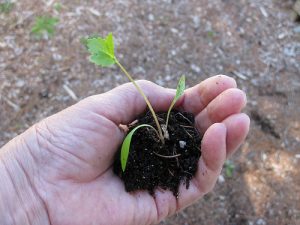Narrative Lectionary for the Eighth Sunday after Pentecost, Year Three
July 30, 2017
Lessons: Ephesians 4:1-16, John 15:1-4
Theme: God’s faithful and generous people do not act alone. We are part of Christ’s body in a specific time and place (congregation). We are stronger together—and better stewards, too!
Key Scripture: But speaking the truth in love, we must grow up in every way into him who is the head, into Christ, from whom the whole body, joined and knit together by every ligament with which it is equipped, as each part is working properly, promotes the body’s growth in building itself up in love. Ephesians 4:15-16
Preaching/Teaching Reflection
What do gardening and the Christian life have in common? For one thing, they both involve cultivation and tending. If you plant a garden, you don’t simply walk away and come back at the end of summer to harvest the fruits and vegetables. If you do, you won’t find much there aside from a patch of overgrown weeds and dried up, sickly plants. One must water, fertilize,  train vines, attend to pests and diseases, pinch off dead leaves and stems, and keep away hungry critters that would steal and devour the plants and their tender, young fruits. It is hard but rewarding work. To plant a garden is to invest in the future of one’s well-being and bountiful table. Such work requires love, attention, care, and commitment.
train vines, attend to pests and diseases, pinch off dead leaves and stems, and keep away hungry critters that would steal and devour the plants and their tender, young fruits. It is hard but rewarding work. To plant a garden is to invest in the future of one’s well-being and bountiful table. Such work requires love, attention, care, and commitment.
“Growing” disciples involves similar effort and process. One doesn’t baptize the person and then attend to cultivating the disciple only a couple of times a year or even just an hour on Sundays. It takes the same kind of consistent effort and commitment to grow disciples and strengthen their faith as it does to take a plant from seedling to abundant harvest. Discipleship is not a once-a-week activity but rather a life-long season of living into one’s identity as a child of God.
Lutheran pastor Michael Foss wrote a popular book several years ago entitled Power Surge: Six Marks of Discipleship for a Changing Church in which he outlined six fundamentals necessary for cultivating a discipleship environment in the local community of faith. Starting always with prayer, worshiping regularly, reading and learning from scripture, serving, developing friendships with other disciples, and growing in generosity are the six basic practices that nurture, nourish, and attend to spiritual growth. Research shows that congregations that cultivate spiritual practices and have high expectations of the community in participation, worship, and service show greater vitality and growth. (1)
Too often we who run in church circles try to segment these basic Christian disciplines and practices into manageable bite-sized pieces and programs – a fall stewardship drive, a heavy-duty Christian education program, an adult forum addressing various prayer practices, a series of small group home dinners, and a weekly Bible study. We scratch our collective heads as worship attendance often remains stagnant or declines and wonder why folks don’t “get it.”
Martha Grace Reese, author of the Unbinding the Gospel series, has worked with more than 500 congregations and 5,000 plus pastors and lay leaders to move from spiritual stagnation to renewed growth, vitality, and missional through careful and deliberate implementation of three “key practices”:
- Laity have a deep, relational sense of faith in God,
- Laity can articulate their faith comfortably, and
- Pastors and lay-leaders hold a laser-like focus on people beyond church walls. (2)
Reese and her team are finding marked successes and a notable challenge. Congregations who take these three practices to heart are growing and finding renewed purpose to share the good news and reach out beyond their walls in mission and ministry. The challenge comes in sustaining these practices of prayer, relationship, and mission. The worldly weeds of complacency, conflict, and fragmentation threaten to crowd out the new discipleship growth and choke the energy and life out of the beloved community.
 So, dear fellow spiritual gardeners, we have our work cut out for us. But what blessed, holy work it is! All our Lord wants from us is everything – a complete and total dedication to the task at hand and the call to discipleship. Think of the work before you in images such as the apostle Paul did in his letter to the church at Ephesus. The discipleship life is organic and must be treated as such. All aspects of growth and maturity must be addressed regularly, and we are exhorted to speak the truth in love for the good of unity and growth. It seems like a daunting task when you think about it, but when attended to daily the work is manageable and rewarding, promising an abundant harvest in due season.
So, dear fellow spiritual gardeners, we have our work cut out for us. But what blessed, holy work it is! All our Lord wants from us is everything – a complete and total dedication to the task at hand and the call to discipleship. Think of the work before you in images such as the apostle Paul did in his letter to the church at Ephesus. The discipleship life is organic and must be treated as such. All aspects of growth and maturity must be addressed regularly, and we are exhorted to speak the truth in love for the good of unity and growth. It seems like a daunting task when you think about it, but when attended to daily the work is manageable and rewarding, promising an abundant harvest in due season.
Remember that you are not alone. The master gardener is on your side, ready to nourish you with the finest bread of his own body and living water. ” “I am the bread of life. Whoever comes to me will never be hungry, and whoever believes in me will never be thirsty,” Jesus says in this week’s gospel lesson (John 6:35). Now grab your tools and start pulling weeds and spreading some fertilizer!
Blessings on your spiritual gardening–your preaching, teaching, and loving those with whom you serve.
1 See, for example, Diana Butler Bass’s book The Practicing Congregation: Imagining a New Old Church (Alban Institute 2004). Chapter four, entitled “Practice Makes Pilgrims,” is particularly pertinent.
2 Reese’s work draws insights from a major Lilly Endowment study of 12,000 congregations representing 49 denominations in eight countries and all 50 states. Click here to read the results of her most recent report to the Lilly Endowment.
In Worship
How does your spiritual garden grow? This is a good week to explore the organic nature of life in the congregation, the local Body of Christ. If you want people to get up and moving, invite them to self-select whether they see themselves as hands, feet, eyes, heart, legs, arms, neck, eyes, ears, mouth, or torso of your congregational body. If they’re not much for getting up and moving around, at least have them discuss this question in small groups.
Consider having the congregation stand and hold hands for a sending prayer and benediction—one large circle (or perhaps more like an amoeba)—to represent the organic, living, breathing Body of Christ in your time and place.
With Youth
Use this lesson from Ephesians to help your youth discern spiritual giftedness. Verse 11 gives some specific gifts, but there are many others. God gives all of us gifts for ministry. Invite your youth to affirm the gifts they see in one another. You can use the ”sticky note” approach where each youth identifies one gift in every other person on a sticky note. Then have the youth go around and place their sticky notes on each other’s backs. One by one have each youth read the notes affixed to their neighbor’s back. Be sure to pray before and after this exercise to set the proper tone and to invite the Holy Spirit to be among you and to inspire you.
With Children
Help children understand Jesus’ metaphor of the vine and branches (John 15:1-4) using an interactive visual. Designate one person to be “the vine” (perhaps a parent, older youth, or willing pastor). Tie brown twine or yarn (one strand for each child) around the vine’s arms. Tie (lightly so that you can easily untie them) the other end of each piece of twine or yarn to a child so that all are connected to “the vine.” As you are doing this, tell the story of why it is important for us to be connected to Jesus relating it to how plants grow. At the end give each child a green paper leaf the words “Gifted Child of God” written on it. Remind each child that he or she is precious to God and to the congregation—that each one possesses spiritual gifts that are needed and valued. Untie them one by one and offer a prayer of blessing and sending.
If you want to extend the metaphor or are using this lesson in a children’s church or Sunday-school setting, consider helping the children plant flower seedlings in small pots they decorate. Encourage children to tend the plants and then give them to someone as a gift to show God’s love.
Weekly Stewardship Bulletin Insert
We are called as stewards to use our gifts and talents for the building up of Christ’s Body in our place and time. What YOU bring to our congregation is important and of great value. Never underestimate the spiritual gifts God has given you! Pray that you will find ways to use them each and every day.
Stewardship at Home
If you live near a vineyard, take a trip to explore and learn about how grapes are grown. Ask about the pruning, tying, and harvesting. Consider planting your own grape vines if you have space. Making wine or grape jelly from scratch is a wonderful experience that brings Jesus’ words in John 15 to life and is also an act of stewardship.
Photos: katerha and steenbergs Creative Commons. Thanks!
Note: Reprint rights granted to congregations and other church organizations for local, nonprofit use. Just include this note: “Copyright (c) 2017, Rev. Sharron Blezard. Used by Permission.” Other uses, please inquire: thewritelife@hotmail.com.



Leave a Reply